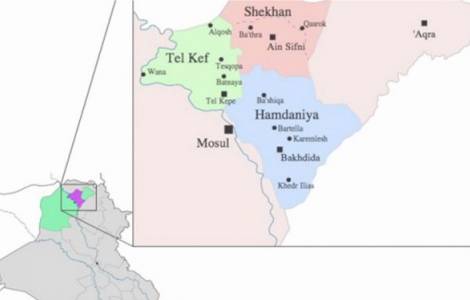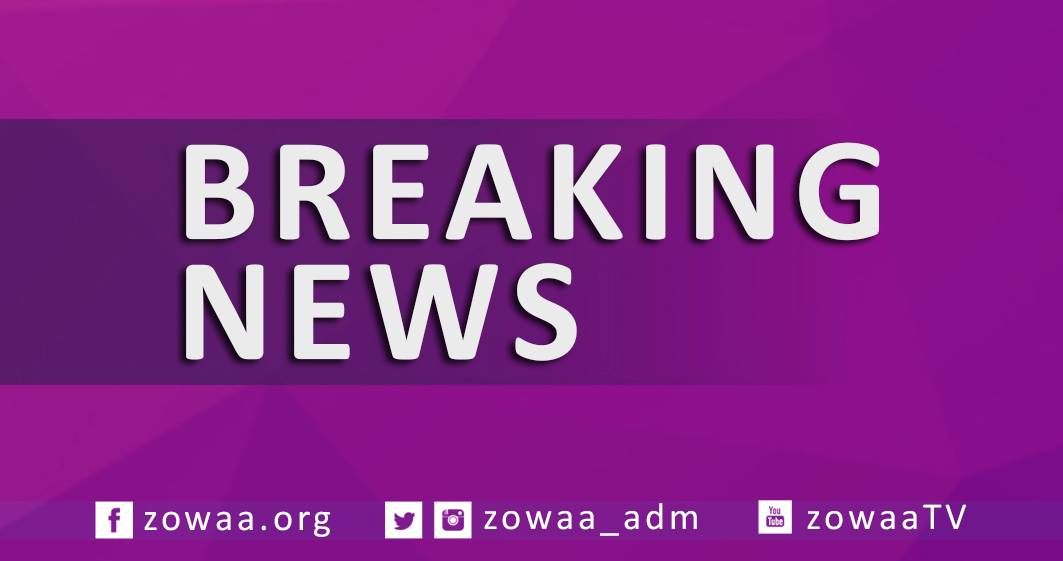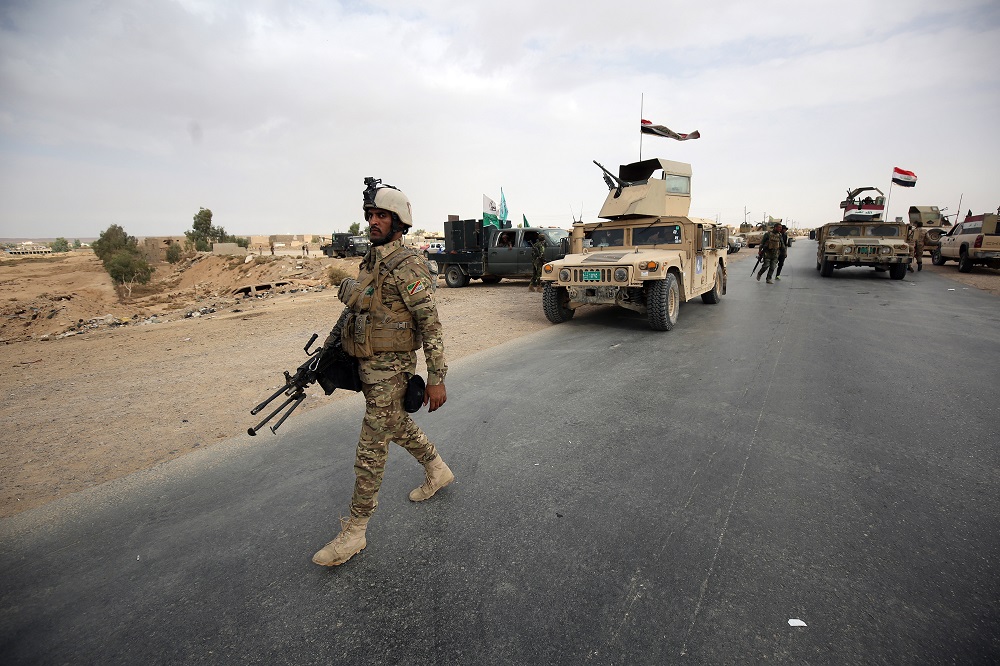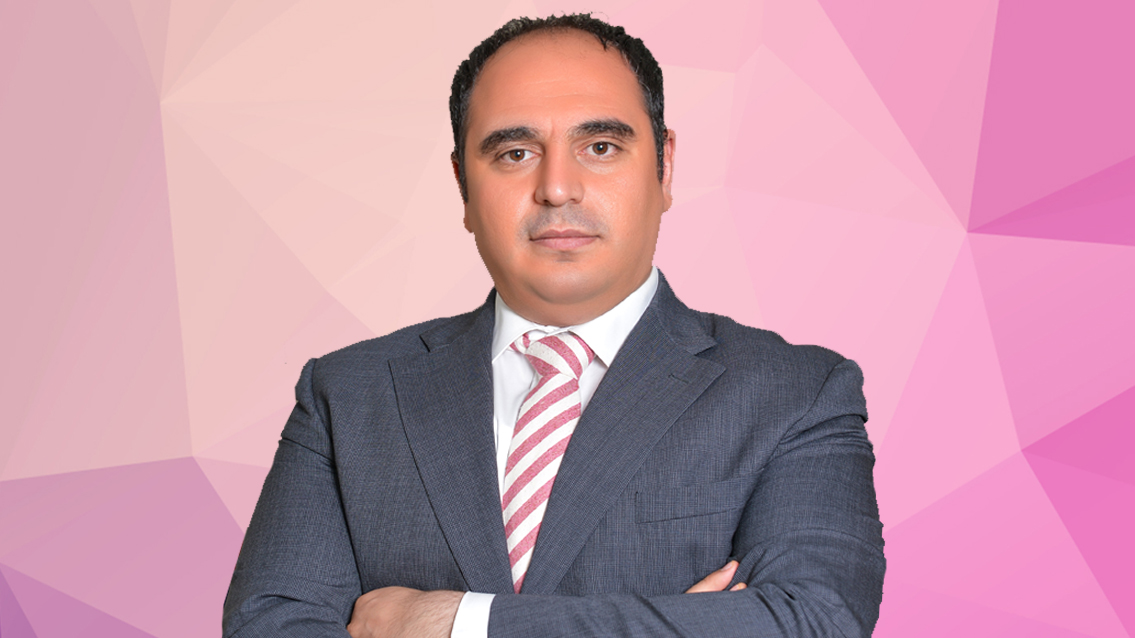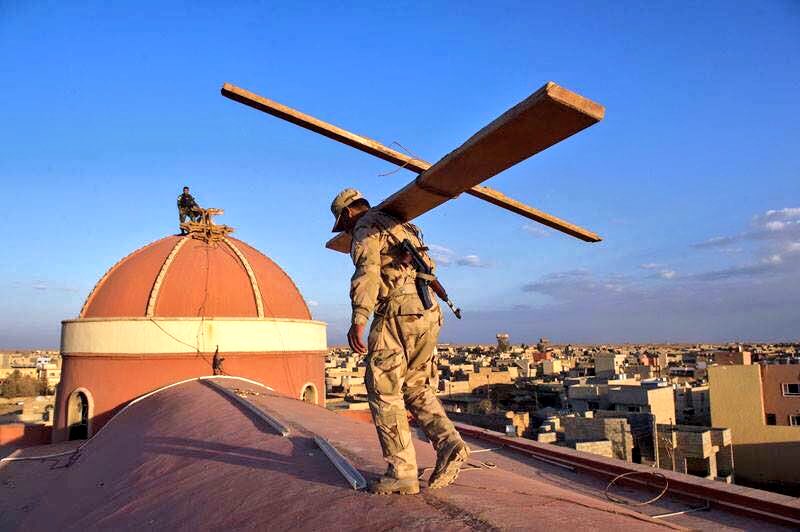- Home
- /
- Northern Iraq, Ethnic Minorities...
- /
- Page 5
- Home
- /
- Kurdish Asayish forces arrest...
- /
- Page 5
Kurdish Asayish forces arrest four young men from our community in Teleskof
According to media sources, the Kurdish Asayish forces arrested four young men in the town of Tesqopa (Teleskof), Nineveh Plain on different and unclear charges in the last two days. Ankawa.com reported that the Kurdish security forces arrested the first young man [Q] on Thursday (November 9) morning. On the same day, another young man [LN] was arrested. A close relative of one of the detainees informed us at Zowaa.org that the two young men are still detained at Asayish headquarters, and reasons for their arrests are still unclear, but one of the charges is believed to be raising the Iraqi flag in the town of Teleskof. Two days ago the Asayish forces arrested two other young men, [ES] and [G], from the town of Teleskof, and they had been released on the same day (according to Ankawa.com). It is worth noting that on November 7, 2017, the Kurdish Asayish forces prevented Fuad Massoud, a leader in the Assyrian Democratic Movement, from entering his own hometown of Teleskof as well. *For security purposes, we will not be releasing the names of the arrested individuals until notified otherwise.
- Home
- /
- UNAMI promises to review...
- /
- Page 5
UNAMI promises to review cases of transgression on our people’s lands
Ruwaida AlHaj (Human Rights Official of UNAMI) assured our representatives that they would follow up with the transgression issue on the lands and villages of our Chaldean Syriac Assyrian people in the Kurdistan Region of Iraq, this will be done through field visits to the villages and meetings with officials in authority to end the mistreatment. This came during a meeting of a UN delegation that included a team of experts headed by Ruwaida AlHaj with representatives of our people in the office of Mr. Jaafar Aymanki (Deputy Speaker of KRG Parliament) on Tuesday November 7, in the presence of Al Rafedain bloc representatives MP Yacoob Gewargis Yaco (head of Al Rafedain bloc), MP Lina Azaria (Al Rafedain) and MP Srood Salim Maqdasy (Abnaa al Nahrain bloc) in addition to a number of other MPs. The two parties discussed the multiple transgression cases on our Chaldean Assyrian Syriac lands and villages in Kurdistan Region of Iraq. Our representatives presented an explanation to the UN delegation which was supported by documents about all the violations and transgressions that were carried out during different stages and time periods. Some issues have been resolved in the courts, but they have not yet been implemented. There are also other issues still under review by the authorities, pending a ruling. They also discussed the absence of the will of the government and the executive authorities. Noting that the authorities haven’t recognized these cases as important as they are, even though they are injustices and violations against the rights of genuine indigenous components of the region


- Home
- /
- World leaders stand up...
- /
- Page 5
World leaders stand up for former IS captive at WYF
World leaders and participants at Egypt’s World Youth Forum stood up to give young Yazidi activist Lamiya Aji Bashar a heartfelt round of applause Sunday.
Bashar, 19, was kidnapped from her Yazidi village, Kojo, and enslaved by the Islamic State group (IS) in Iraq for 20 months, sold several times in Iraq, Syria, and back in Iraq. She tried to escape, but in her fifth attempt in Mosul, she was critically injured in a landmine explosion.
Girls who were trying to escape with her were killed in the process.
Egyptian President Abdel Fatah al-Sisi and First Lady Entissar Amer were clearly emotional as they listened to Bashar. Other leaders, such as Palestinian President Mahmoud Abbas, looked perplexed at Bashar’s account of how IS believed they would go to heaven for raping girls.
Bashar, who was 15 when her village was raided by IS, emphasized that about 3,500 Yazidi girls are still captive. She asked all communities around the world to help in the fight against terror, and, speaking for victims of terrorism, offered efforts to build bridges between world ethnicities and religions.
“Your dreams are big… but your will is bigger, and your energy for building, peace and love is even larger,” Bashar said to the young participants of the World Youth Forum.
- Home
- /
- A leader in the...
- /
- Page 5
A leader in the Assyrian Democratic Movement is demanding the Peshmerga withdraw from Nineveh Plain areas to avoid any tension that could lead the area into more disasters.
Zowaa.org / Nineveh Plain
A member of the Political Bureau of the Assyrian Democratic Movement, Mr. Gevara Zaia, called for the withdrawal of the Peshmerga forces from the rest of the Nineveh Plain areas such as Alqosh, Tesqopa (Teleskof) and Shikhan, as well as from Kirkuk and the other so-called “disputed areas” in order to avoid any tension that could lead to more disasters in the region and to fulfill the enforcement of the rule of law.
On October 24, 2017, as a result of the clashes, nearly 1,000 families were displaced from the villages of Tesqopa and Baqopa, resulting in a number of civilians wounded. The residents are still displaced, causing disruption to their governmental work in schools, the rest of the districts, and affecting their regular jobs in agriculture and markets.
Gevara Zaia emphasized: it is necessary to delegate the authority of the law, both “administrative and security”, to the official local institutions of the sub-districts of the Nineveh Province and to the local security forces, such as the police and the local crowd.
Zaia refuses to administrate the Nineveh Plain areas jointly between the region (KRG) and the center (Federal Government), stating that this kept the residents in a state of anxiety and fear of further tension.
The participation of the local residents in administrating and securing their areas is evidence of the lack of marginalization experiences by authorities, and as a principle of local representation in the political future of these areas, he added.
The clashes in Tesqopa wounded 3 people, including 2 children, all wounded near their homes in a local neighborhood. As a result of these clashes, 1000 families were once again displaced. The people of the Nineveh Plain have called to avoid clashes and bloodshed in their areas, so as to not repeat the scene of displacement that the residents experienced when the area was hit by tragedies from the invasion of ISIS, which led them into a mass displacement from their homes lasting over 3 years.
- Home
- /
- Land grabbing and transgressions...
- /
- Page 5
Land grabbing and transgressions continue in Naf Kendala village within the Zakho District.
A group of members of the Kurdish village of Sarsolavki in the Darkar District, led by Tayeb Sallou Aziz, vandalized the fence of a farm belonging to the village of Naf Kendala in the Zakho District. In his statement to Zowaa.org, the village’s mayor said that at 10 am on Friday, November 3, 2017, a group led by Tayeb Sallou Aziz from Sarsolavki vandalized the fence and seized 3 acres of a farm that belonged to the village of Naf Kendala. The village mayor requested for political and governmental authorities to intervene to solve the problem and to put an end to the transgression, hoping to implement the law and end all transgressions in the village led by the Kurds of neighboring villages. There is a committee from the local police heading to the village to locate the transgression site. The village mayor went on to say: There have been transgressions on the territory of the village since 1993, about 750 acres located between the village of Berseve and the village of Naf Kendala and since then we have filed complaints to the court and the security authorities, which have led no where. There has been a lack of direct intervention of the administrative authorities of the district and the district director, they formed committees to address the abuses with just decisions taken by ink on paper without any implementation and with no accountability to the abusers. This has all led us to today – where they have returned once again and grabbed another farm, given the absence of the law to deter them. The village mayor urged all relevant authorities to intervene to end the transgressions that have taken place since 1993 until today and to restore the property rights to the owners of the land. He assured that the rightful owners have the property documents that prove their ownership of the lands.
- Home
- /
- Kurdish security forces prevented...
- /
- Page 5
Kurdish security forces prevented a leader in Assyrian Democratic Movement from entering into Telesqof
On Sunday, November 5, 2017, the Kurdish security forces prevented a leader of the Assyrian Democratic Movement, Mr. Fuad Masoud, from entering the town of Tesqopa (Teleskof) on false pretexts. The Kurdish Asayish forces prevented Fuad Massoud, who is a resident of Tesqopa, from entering his town, knowing that his family is still living in the town. At the same time, the Asayish informed the Assyrian Democratic Movement headquarters in Tesqopa to immediately evacuate the headquarters. Previously, the Kurdish Asayish forces prevented ADM local official of Tesqopa headquarters, Mr. Talal Korial, from entering the town although he is one of its residents, in addition to blocking other residents from entering the town of Tesqopa.
- Home
- /
- ABADI: IRAQI FORCES RETAKE...
- /
- Page 5
ABADI: IRAQI FORCES RETAKE AL-QAIM FROM ISLAMIC STATE
– Iraqi Prime Minister Haider al-Abadi announced the liberation of al-Qaim town from the Islamic State (ISIS) militants, driving another nail into the coffin of the jihadists’ self-styled caliphate.
Abadi hailed the “liberation of Al-Qaim in record time” in a statement on Friday (November 3), after Iraqi troops entered the key town on the border with Syria on Friday morning.
Earlier, Iraqi forces regained control of an important crossing on the border with Syria from the militants.
Iraqi forces unleashed a barrage of artillery fire against jihadist positions inside the town, backed by Iraqi and U.S.-led coalition air strikes.
Government forces launched the operation last week to seize Al-Qaim and its surroundings, a pocket of barren desert along the Euphrates river near the border with Syria.
Al-Qaim and the surrounding areas were the last remnants of the self-styled caliphate ISIS declared after rampaging across Iraq and Syria in 2014.
ISIS is simultaneously battling for survival in its holdouts across the border in Syria, where government troops said they ousted the group from the key city of Deir Ezzor on Friday.
- Home
- /
- A statement by...
- /
- Page 5
A statement by Kaldo Oghanna regarding the Lars Adaktusson Brussels Conference
We are saddened and shocked that MEP Lars Adaktusson is using the esteemed European Parliament as the venue to deny the political will of the Chaldean Syriac Assyrian people. On March 6, 2017, ten of our political parties signed a joint statement agreeing to a collective policy that was presented to the Government of Iraq and the Kurdistan Regional Government as a list of our agreed upon political demands.
The March 6 Joint Statement requires the creation of a Nineveh Plain Province, would build our administrative and self-defense capabilities, remove the Nineveh Plain from the devastating impact of the Kurdistan Regional Government and Government of Iraq political struggle and gives our people a choice of whether to hold a referendum or not, on our terms.
The March 6 Joint Statement reflects progress in the politics of the Chaldean Syriac Assyrian people. This was communicated to MEP Lars Adaktusson on three occasions. However, he proceeded with his conference which seeks to undo our progress by rejecting our political will, imposing an agenda that requires a referendum, restoring elements of the pre-ISIS/June 2014 security status quo which failed us completely and exposed us to genocidal violence.
A boycott by three of our political parties and two churches forced the policy organizers to change the draft policy document originally distributed before the conference. The changes made in the final statement are not honest efforts to address the ADM’s concerns but only better hide a foreign agenda. It is sad and ironic that a Chamber which represents the unified will of the diverse European people is being used to divide the unified will of the Chaldean Syriac Assyrian people and impose a foreign agenda on us”
Kaldo Oghanna
Political Bureau Member
Assyrian Democratic Movement
Jul 5, 2017
- Home
- /
- USAID Press Release: Funding...
- /
- Page 5
USAID Press Release: Funding Opportunity for Return of IDPs in the Nineveh Plain
Today the United States Agency for International Development (USAID) Office in Iraq issued a call for expressions of interest to fund activities that assist in the voluntary return of Internally Displaced Persons (IDPs) in the Ninewa Plains and western Ninewa, and to encourage those who are already in their communities to remain. Ambassador Douglas Silliman stated that, “This initiative will allow the U.S. government to work hand-in-hand with organizations and private companies to help communities persecuted and displaced by violence to build a stronger future.”
With the liberation of ISIS-controlled territory, approximately 2.2 million Iraqis have already returned home, yet another three million Iraqis remain internally displaced. Many of those displaced are minorities, including from diverse religious and ethnic groups. People in the Ninewa Plains and western Ninewa face unique post-conflict challenges, and the factors that influence these individuals to return to their homes and remain there need to be identified, assessed, and addressed.
The intent of this funding announcement is to allow co-creation and co-design — to the maximum extent possible — to create high-quality, effective, and efficient partnerships for research, development, piloting, and testing of innovative, practical, cost-effective, and scalable interventions.
Interested parties should refer to www.fbo.gov or www.grants.gov for the full Broad Agency Announcement (BAA) posting and submission requirements.
Submissions are due by November 30, 2017.


